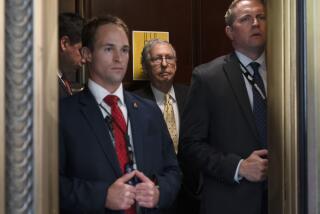WASHINGTON INSIGHT
- Share via
ONCE BURNED, TWICE SHY: It may have taken him a while, but House Speaker Newt Gingrich (R-Ga.) apparently has figured out one ironclad rule of U.S. politics--it doesn’t pay to mess with Medicare. Campaigning for his reelection Wednesday, Gingrich said that if Republicans retain control of Congress, they will leave the prickly task of restructuring Medicare’s financing to a bipartisan commission--an idea President Clinton and his GOP challenger, Bob Dole, have endorsed. Gingrich’s comments represented a striking departure from the partisan strategy he spearheaded last year as the GOP sought to slow Medicare’s growth to help reduce the deficit--an effort that led to two government shutdowns and opened GOP candidates to Democratic criticism this fall. Even as he embraced the commission idea, Gingrich retained a hard edge in assessing the fallout of his previous approach. “There’s no question that Clinton out-maneuvered us in the budget fight, and there’s no question that we underestimated their willingness to lie about Medicare,” he said.
*
RALLYING THE FAITHFUL: Disappointed in Dole’s reluctance to emphasize social issues like abortion, leading religious conservatives already are talking about a preemptive effort to unite behind a GOP candidate for the year 2000 if Dole loses Tuesday. Although the Christian Coalition is unlikely to endorse a candidate, its leaders and other social conservative groups may move to effectively tap one hopeful on the shoulder and steer support to that campaign early on, sources familiar with the discussions say. Planners already see one big hurdle: While eager to find a fresh face, they acknowledge it would be difficult to unite religious conservatives behind an alternative candidate if either former Vice President Dan Quayle or Patrick J. Buchanan, both favorites of antiabortion activists, enter the race.
*
MEANWHILE, BACK IN 1996: The Christian Coalition’s voter guides--about 46 million of which are to be distributed at 125,000 churches nationwide this weekend--are stirring controversy. The group records the positions of Clinton and Dole on 10 issues; on all but one, Food and Drug Administration regulation of tobacco, Dole supports and Clinton opposes the position generally taken by the group. But critics, like the organization of moderate and liberal religious leaders called the Interfaith Alliance, say the Christian Coalition stacked the issues to place Dole in the best possible light. Jill Hanauer, the alliance’s executive director, notes that the guides include non-cultural issues like the balanced-budget amendment, a 15% cut in income tax rates over three years and term limits, but leave out the V-chip, family and medical leave and the minimum-wage hike--all questions where Clinton’s support might be more in tune with many evangelical voters than Dole’s opposition.
*
SOME CLEVER TEAMWORK: Because his last public post was as secretary of state, Edmund Muskie--who died earlier this year--is remembered by some mainly as a statesman. But as a longtime Maine senator and 1968 Democratic vice presidential candidate, Muskie also was a resourceful pol. And he would have admired the way his old friends managed to push through Congress $3 million to fund a foundation established to preserve Muskie’s memory. What made it possible was a similar $3-million authorization approved by the House to support the George Bush School of Diplomacy at Texas A&M.; Democratic Sen. Wendell H. Ford of Kentucky, aided by Republican Sen. William S. Cohen of Maine, made plain to his colleagues there would be no money for the Bush school unless there was money for the Muskie foundation. Sure enough, on Oct. 4, the Bush and Muskie authorizations, both tagged on to an obscure human rights bill, sailed through Congress.
More to Read
Get the L.A. Times Politics newsletter
Deeply reported insights into legislation, politics and policy from Sacramento, Washington and beyond. In your inbox twice per week.
You may occasionally receive promotional content from the Los Angeles Times.










